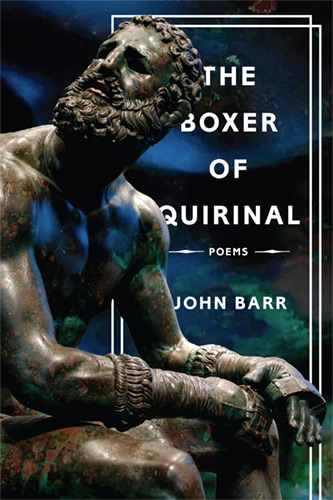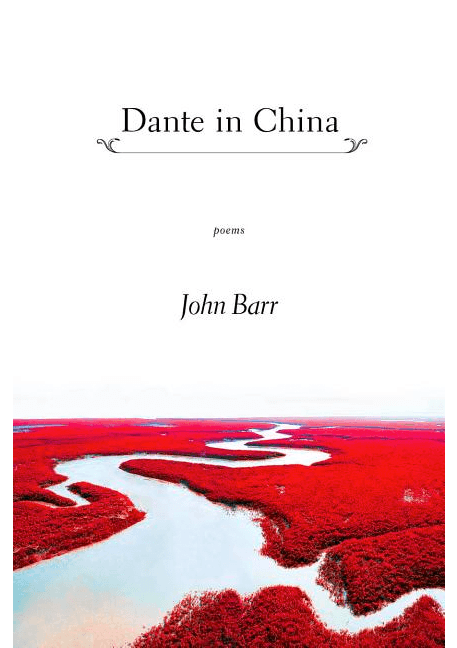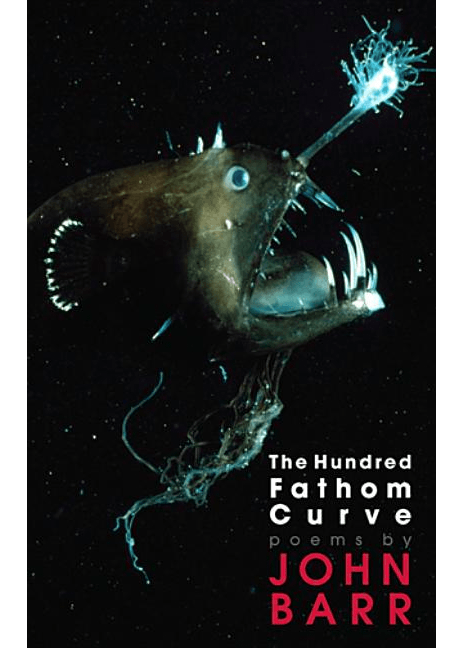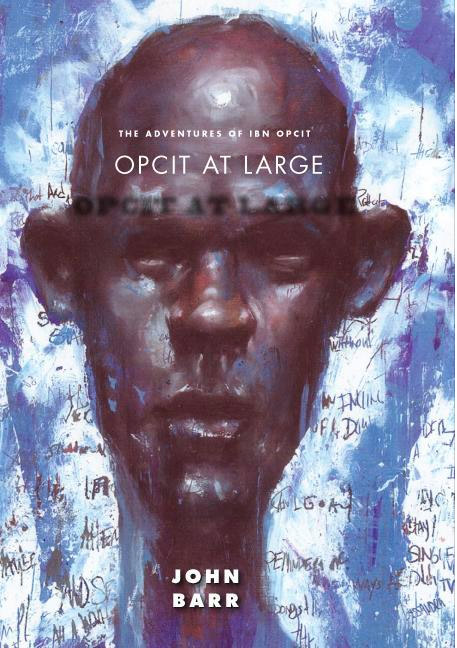Reviews

For The Boxer of Quirinal
“John Barr’s collection takes its title from an ancient Greek statue that was unearthed after 2,000 years—a fitting emblem for a poet inspired by the deep connections between past and present, history and nature. Whether he is writing about mushrooms on a forest floor or a Civil War battle, Barr offers pleasures that are seldom found in contemporary poetry: a strong formal imagination and the company of an adventurous mind.”
—Adam Kirsch, author of The Discarded Life
“In his tenth book of poems, John Barr succeeds with an ambitious spectrum of form and content. His subject matter spans from classical to contemporary. Like his titled boxer, Barr contends with all sorts of challenges, and he prevails, whether encountering a haruspex or a utility company! Most outstanding is his epic on the South China Sea, where politics meets poetics and history tells a story with surprising strength and finesse.”
—Susan Kinsolving, author of Peripheral Vision
“The poems in The Boxer of Quirinal deal with life and death in the natural world as well as in conflicts created by humans … John Barr creates … thoughtful poetry that will challenge you at every turn.”
—Bill McCloud, editor of The VVA Veteran. Full review | PDF version
“The poems in Barr’s The Boxer of Quirinal cover a wide range of subjects … But a clear and urgent theme unites these poems: the theme of survival. What’s more, Barr’s use of language is rich and masterful … This is a book you’ll want to reread again and again.”
—Brian Emery, Amazon.com customer
“John Barr has woven a brilliant patchwork of poems that sing, together, of survival. He tells diverse stories — of the Civil War, of a heron, and even of life while his brother is in hospice — with mesmerizing economy, precision, and sharpness. The Boxer of Quirinal is a beautifully balanced and urgent book. Reading it felt soul-enriching. I highly recommend it.”
—Macy LaDuke, Amazon.com customer

For Dante in China
John Barr has a naturalist’s flair for identifying and naming the more curious phenomena and events of experience. He is a master builder. He is learned enough to wear his learning lightly. Thought and feeling flow in and out of each other with a beautiful fluency in his poems, and they balance each other perfectly. Most wonderful of all, he has a deep sonic wisdom and creates palaces of sound where we can sit and listen and listen.”
—Vijay Seshadri, author of the Pulitzer Prize-winning 3 Sections
“W. H. Auden once longed for the return of a ‘civic poetry,’ by which he meant two things: a poetry whose subjects would be interesting to people who had no primary investment in the art, and a poetry that managed to entertain and instruct at the same time. How happy Auden might have been with this inventive, various, and large-spirited book by John Barr! I hope it finds the wide audience it certainly deserves.”
—Christian Wiman, author of Once in the West, finalist for the National Book Critics Circle Award
“The book’s powerfully imagined final poem, ‘Aristotle’s Will,’ is like nothing in our poetry. … It is a wonderful work.”
—Ilya Kaminsky, co-editor of The Ecco Anthology of International Poetry
“John Barr’s poems stake out the intersection of wit, philosophy, grace, shadow, and an unabridged dictionary. And they travel far.”
—Sarah Lindsay, author of Debt to the Bone-Eating Snotflower

For The Hundred Fathom Curve
“Nothing has a right to the space it occupies” says John Barr in one of his poems, and this tough-minded remark is typical of the skeptical eye his work casts upon the thousand-thinged world. Barr’s speaker is wary of what is “arty and not true” and is often in despair to see “what one must do to excel.” Nonetheless these poems are full of admiration for creation, and the created—geological schist and Hudson River divers, spiderwebs, and hydroelectric dams. The Hundred Fathom Curve is a panoramic suite, meditating on means and ends, interrelationships; nature and history. Lucid, discursive, taut in phrasemaking, lit by memorable images, these poems are lively, probing and finally convey the pleasures of an especially thoughtful and wide-ranging amazement. —Tony Hoagland
“John Barr is a poet of elegant saying rather than singing, and his subjects are the familiar guiding stars of our common life: love, its presence or absence; war; the physical world and, especially, as in the quiet but profound requiem, “The Dial Painters,” the investigative empathy toward others that keeps us civilized. Still, in these precise and thoughtful meditations, the music of spontaneity and rejoicing—that is of course behind everything—must from time to time break out: “I live in a settlement of two hundred bones,” he writes of himself; or remembers his father, with his ham radios, wanting to “travel in the company of light”; or with delicious humor, imagines the yard wisteria “Offspring of wistful and hysteria.”
“These are poems to read more than once: John Barr is excellent company at every visit. He is in fact an extraordinary man, both a poet of passion and the most delicate workmanship, and a man of the material world, especially the world of finance and diplomacy, where, I dare say, passion and delicate workmanship are also necessities. We, who honor literature, also live in the world—and it is to our betterment twice, then, that John’s excitement, exactitude, and caring are so large and devotional—thus he twice renders the world good service, including, in his poems for sure, much pleasure, good thought, and happiness.” —Mary Oliver

For Grace
“The six parts of [Grace] add up to linguistic tour de force, verbal playfulness reminiscent of the work of James Joyce or Anthony Burgess. Grace is a unique reading experience, guaranteed to add spice to the ‘glum tostada’ of American poetry.” —Library Journal
“I have relished reading Grace and rereading it many times. I think it is an extraordinary piece of writing, so daring and yet so joyfully positive. At times uproariously funny, and then, suddenly, so beautifully sad, a wondrous attempt to humanize the language that for me translates into sheer reading pleasure. I keep it on my small private bookshelf, it has given me a reading pleasure that doesn’t come often from new poetry these days.” —Alastair Reed, New Yorker
“John Barr’s Grace is a wonderful surprise. It’s that rarest, rarest, rarest of phenomena, an enjoyable book of contemporary poetry. He’s on to something marvelous. The potential of his new approach is limitless.” —Tom Wolfe
“In Grace, not only does John Barr handle the demanding form of the long poem with skill and panache, but he delivers a one-of-a-kind linguistic tour de force. Spoken mostly with a Caribbean dialect and rollicking with word play, Grace achieves a riotous level of verbal inventiveness. I don’t know of any other work with which to compare it unless we think of it as a kind of funky Finnegan’s Wake in verse with palm trees. You have never read anything quite like this wildly sustained imaginative drama. Set those one-page lyrics aside and dive into this momentous feat.” —Billy Collins
“John Barr’s Grace is an incredibly risky poem about white American consciousness in the instant of attempting sympathy with black American (in this case Caribbean) consciousness. This cross-cultural ambition could be any more vertiginous, but that doesn’t mean that it’s not crucial to the regional literature. Barr’s courage and zeal for the project are astonishing, and his ambition should be the wonder of writers and readers north and south of the Panama Canal.” —Rick Moody, author of The Ice Storm

For Opcit at Large
“Review of Opcit at Large, The Adventures of Ibn Opcit, Book II” by Leia Menlove in Foreword Reviews. Full review | PDF version
